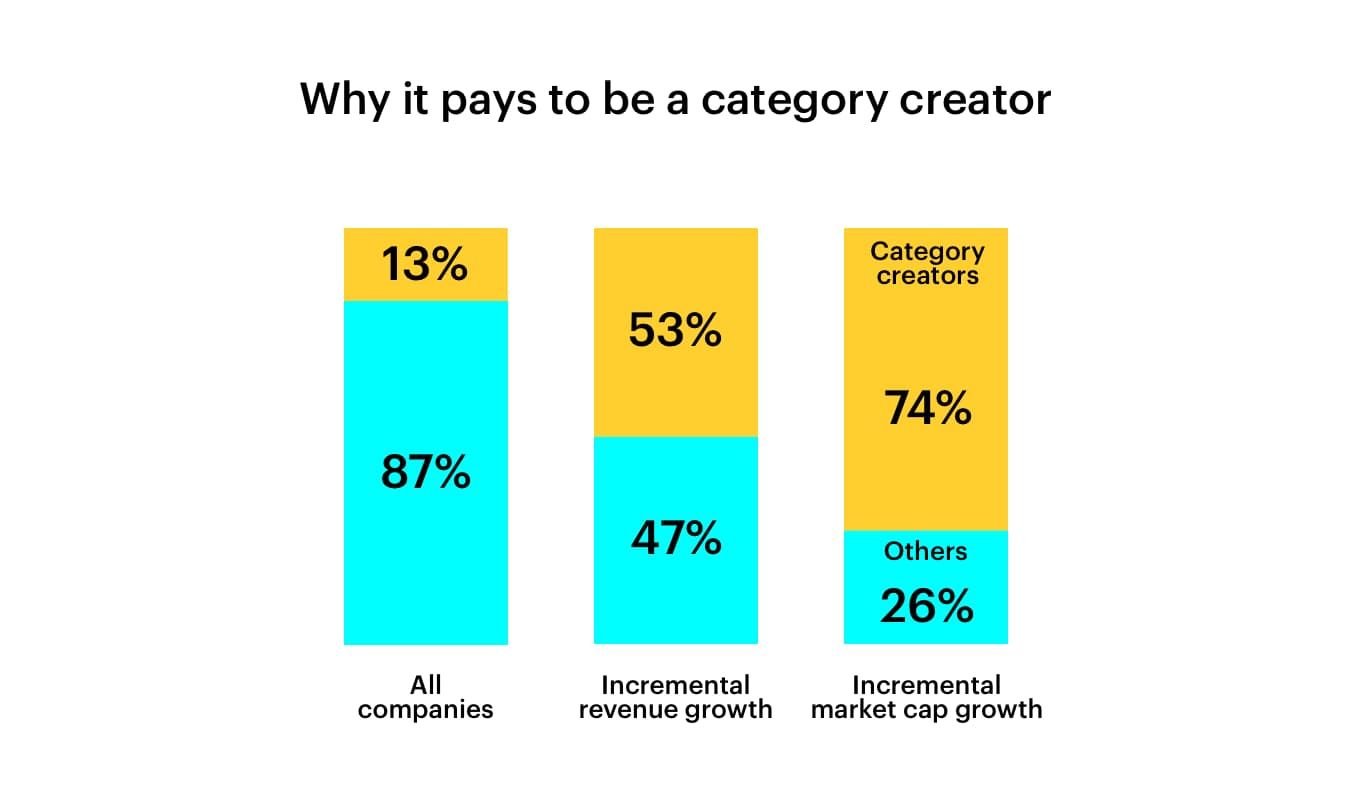
GNT #023: Think bigger. How innovators dominate with category creation.
Jun 22, 2023Read time: 4.5 minutes
Are you tired of playing the same old game?

Feeling stuck in doing the same thing and hoping for different results.
The top innovators in the world used to feel the same way too.
Then, they used an under-the-radar strategy that helped them reinvent and propel their business.
The strategy?
It's called category creation.
Today, we will unveil the secrets behind how successful innovators are dominating their markets with category creation.
And, how you can to.
Let's get to work.
What the heck is category creation?
The term category creation was coined by the authors of the book Play Bigger.
According to Category Pirates (yep that's the actual name of a Digital Academy that teaches on the subject), category creation is a strategy that, "introduces the world to a new, different approach."
It allows you to design your own game vs. playing someone else's.
-
Category creation = creating new categories of products and services and educating the market on the new category.
-
People are smart.
They know that most businesses are fighting with each other to get their money.
Category creation allows you to present a real problem and unique solution AT THE SAME TIME.
You immediately distinguish yourself from the competition.
And the really special thing about educating the market about your category - is that you inevitably build brand awareness.
That awareness is deep and memorable - because it's about values, not aesthetics.
Category creation is about creating new value for people where none had existed before.
Whereas old-school marketing is like shouting, "WE'RE AWESOME. BUY FROM US."
Companies who are "us" focused will always get crushed by companies who are "them" focused.
When people care about the category, they also value your company and they will tell others about you.
 image from intercom.com
image from intercom.com
Still following?
Great. Let's get out of theory and look at some real-world examples.
Examples of category creation
Businesses that employ category creation aim to improve people's lives.
1. Liquid Death
"Murder your thirst. Death to plastic."
Liquid Death is a category creator because it has redefined the traditional perception of bottled water and created a distinct category within the market.
(I know right? It's just water in a can. 🤷🏻♀️ But...)
According to Liquid Death's website:
_
"Plastic is not technically recyclable anymore because it is no longer profitable to recycle. Most recycling facilities simply send plastic to landfills because they would go out of business trying to recycle it. Environmental economists now say it is actually better for the planet to simply throw your plastic in the trash so that it requires less trucking to get it to the landfill. Sad stuff. But of all the aluminum produced since 1888, over 75% of it is still in current use."
_
Also, the creator of Liquid Death wondered why no one had marketed water in a similar manner to Monster energy drinks.
Through their branding, messaging, and unique approach to packaging, they have attracted a specific audience and established themselves as a category creator.
Oh, and they're already valued at $700 million as a 3-year-old startup.
2. Airbnb (short-term-rentals)

Yep, that's an actual Airbnb ↑.
After moving to San Francisco in October 2007, roommates and schoolmates Brian Chesky and Joe Gebbia came up with an idea of putting an air mattress in their living room and turning it into a bed and breakfast.
Airbnb disrupted the traditional hospitality industry by creating a new category of short-term vacation rentals.
They created new value by connecting homeowners with travelers in a new way with unique and personalized lodging that went way beyond the traditional experience.
Airbnb's platform created a marketplace that revolutionized the way people travel and find accommodations.
Oh, and Airbnb generated $8.3 billion in revenue in 2022, a 40% year-on-year increase.
3. Saunable (mobile woodfire sauna)

YOU: "What? What is this? What mythical story are you weaving here, Colleen?"
Well, I wanted to bring all these theories and examples of category creation down to a micro level.
One that you could relate to.
My husband Ed and I were going to put an electric sauna in the basement.
Health is important to us. My mom died from cancer when I was 13 and Ed lost his Dad in 2015. We have been passionate about longevity and living as best we can for our ourselves and our kids.
Before pulling the trigger on the basement sauna, Ed posed the following question to me:
_
"Sauna is proven to lower all-causes of mortality by 40%, but not everyone has access to good quality sauna. What if we maximized the sauna experience, put it on wheels, and added cold plunge / contrast therapy options so each person can have their own best version of therapy, healing, and recovery."
_
Unmet need. ✔
Think differently. ✔
Focus on them. ✔
ME: "Let's get started."
We are close to completing Saunable mobile sauna unit #1 (still looking for a better model name).
But the reaction to this new venture and category, even this early, has been inspiring and humbling.
Now, let's talk about you.
Applying category creation to your life and business
We've talked about the theory and gone through some examples.
Let's bring it closer to home.
Here's how you can apply category creation thinking in your own endeavors:
Listen:
- Ask questions, seek deeper understanding
- Identify an unmet need: Look for gaps in your personal life or business.
Challenge the status quo:
- Think of expanded ways to address challenges beyond the transactional.
- Don't be confined by existing market boundaries.
Create a new category:
- Think beyond features: Focus on the emotional and aspirational benefits that your category could offer, rather than just the functional attributes.
- Differentiate yourself: Define YOUR unique value proposition and find ways to stand out from from competitors or conventional options.
- Embrace innovation & technology: Explore how technology or systems can enhance, improve convenience, or create new experiences.
- Narrow your focus: Define a specific niche within your category. Establish a strong position. Don't be generic.
- Category creators are known for radical generosity and empathy.
Share your category:
- Build a community: Nurture connections and a sense of belonging among your customers or like-minded connections.
- Position yourself as the authority: Educate the market about the benefits and possibilities of your category. Drive conversations. Shape perceptions. Set the agenda.
- Evangelize how you're different, not better.
- Be first: Pioneers often get the advantage.
- Tell compelling stories: Use stories to connect with your audience, communicate the value of your category, and create a memorable experience.
- Rally the support from influencers, super-connectors, and thought-leaders. Build a collaborative, connected ecosystem around the category. (Read more about how to grow with collaboration).
Takeaway
Category creation isn't limited to large corporations.
You can create a whole new game.
I can't wait to see what you come up with!
Whenever you're ready, there are 3 ways I can help you:
1. Need some guidance? I'm here to help. Book a 1:1 worksession with me now.
2. Have a topic you want broken down into actionable steps? Send it to me and I'll write about it.
3. Want short, but meaty tips on growth systems for profit, purpose, and life. Follow me on LinkedIn
p.s. Will the contrast-therapy mobile sauna category stick? I'll keep you posted over here.
Build purpose-driven growth and audience
Join other subscribers who get 1 actionable tip every Thursday morning.
I will never sell your information, for any reason.

